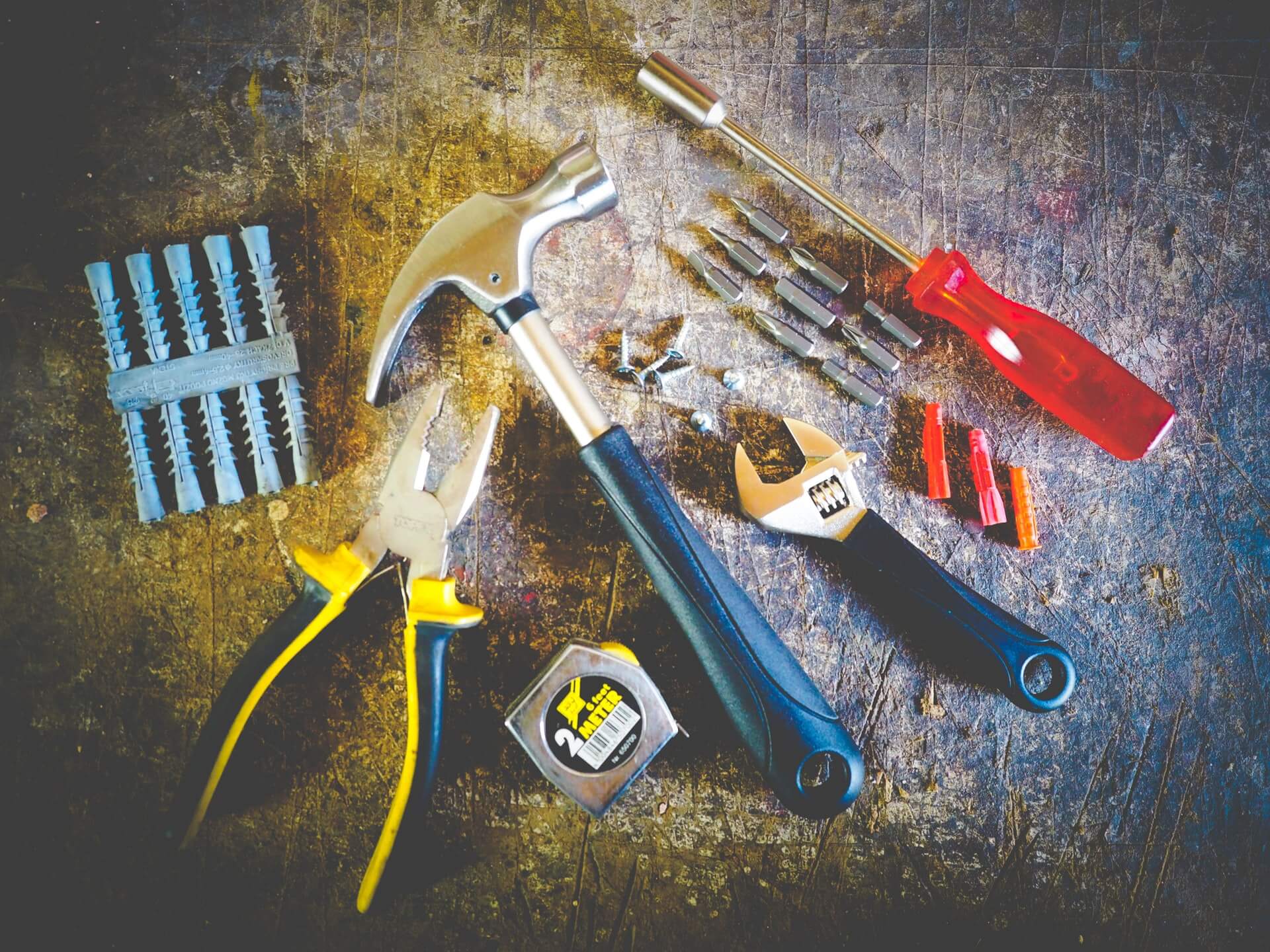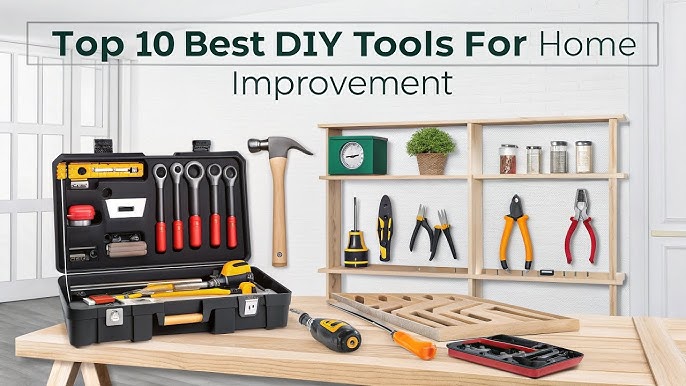Are you ready to tackle those home projects with confidence? Whether you’re fixing a leaky faucet, hanging a new picture frame, or assembling furniture, having the right tools makes all the difference.
Imagine saving time, money, and frustration by knowing exactly which DIY tools every homeowner should have. You’ll discover the essential tools that will turn you into a home repair pro. Keep reading, and soon you’ll be equipped to handle almost any job that comes your way.
Basic Hand Tools
Every homeowner needs some basic tools. These tools help with small repairs and projects. A well-equipped toolbox saves time and money.
Let’s explore the essential tools every homeowner should own. These tools are easy to use and handy for various tasks.
Hammer And Nail Set
A hammer is a basic tool for every home. It helps in hanging pictures and assembling furniture. A nail set includes different sizes for different tasks.
Choose a hammer with a comfortable grip. A claw hammer is versatile for most household needs.
- Use a hammer for driving nails into wood.
- Nail sets provide nails for different projects.
Screwdrivers
Screwdrivers tighten or loosen screws. They are necessary for assembling furniture and fixing appliances. Both flathead and Phillips head screwdrivers are essential.
Look for screwdrivers with magnetic tips. They make it easier to hold screws in place.
- Flathead for slotted screws.
- Phillips for crosshead screws.
- Magnetic tips prevent dropping screws.
Tape Measure
A tape measure is vital for precise measurements. It is useful when buying furniture or planning a renovation. A 25-foot tape measure covers most needs.
Ensure the tape measure has a clear, easy-to-read scale. A locking feature helps hold the measurement in place.
- Measure spaces before buying furniture.
- Use for accurate home improvement projects.
Utility Knife
A utility knife is perfect for cutting tasks. It works well on cardboard, rope, and drywall. A retractable blade adds safety and convenience.
Keep extra blades handy for clean and smooth cuts. A utility knife with a comfortable grip reduces hand strain.
- Cut open boxes and packages easily.
- Trim materials for DIY projects.
- Always retract the blade for safety.
Power Tools
Power tools help homeowners complete tasks faster and easier. They are useful for many projects around the house.
Having the right power tools makes repairs and improvements simpler. These tools save time and effort.
Cordless Drill
A cordless drill is a must-have for drilling holes and driving screws. It works without a power cord for easy use anywhere.
Most cordless drills come with adjustable speed and torque settings. This helps you work on different materials like wood and metal.
- Portable and lightweight
- Rechargeable batteries
- Variable speed control
- Easy to handle for beginners
Jigsaw
A jigsaw cuts curves and shapes in wood, metal, and plastic. It is perfect for detailed cutting work.
The jigsaw uses a small blade that moves up and down quickly. You can follow lines or patterns for precise cuts.
- Good for curved cuts
- Works on many materials
- Light and easy to control
- Use different blades for different jobs
Orbital Sander
An orbital sander smooths surfaces by sanding wood, metal, or plastic. It helps prepare surfaces for painting or finishing.
The tool moves the sanding pad in small circles. This action reduces scratches and gives a smooth finish.
- Easy to use on flat surfaces
- Reduces sanding time
- Works with different grit sandpapers
- Good for refinishing furniture
Measuring And Leveling Tools
Measuring and leveling tools help homeowners complete projects with accuracy. They ensure that things fit well and look right.
Using these tools reduces mistakes and saves time. Every homeowner should have them in their toolbox.
Level
A level checks if a surface is flat or straight. It helps hang pictures, shelves, and cabinets evenly.
Levels come in different sizes and types, like bubble levels and laser levels. The bubble level is simple and very common.
- Place the level on the surface.
- Check the bubble inside the tube.
- If the bubble is centered, the surface is level.
Square
A square helps measure and mark right angles. It is useful for framing and woodworking projects.
The most common type is the carpenter’s square. It ensures corners are exactly 90 degrees for strong joints.
- Use the square to check corners and edges.
- Mark straight lines along the edge.
- It helps cut materials accurately.
Stud Finder
A stud finder locates wooden studs behind walls. This tool helps hang heavy items safely.
Stud finders use sensors to detect changes in the wall density. They make sure screws go into the stud for strong support.
- Turn on the stud finder and place it on the wall.
- Slowly move it horizontally.
- It will signal when it finds a stud.

Credit: www.youtube.com
Cutting Tools
Cutting tools are important for many home tasks. They help you shape and fix things easily.
Every homeowner should have a few cutting tools. They save time and make work safer.
Handsaw
A handsaw cuts wood and plastic well. It is easy to use and does not need power.
Choose a handsaw with sharp teeth and a comfortable handle. It works best for small projects.
- Good for cutting boards and branches
- Portable and simple to carry
- Works without electricity
Wire Cutters
Wire cutters are used to cut metal wires and cables. They have strong jaws and sharp edges.
These tools help with electrical work and repairs. Use insulated handles for safety.
- Cut electrical wires and small nails
- Useful for garden fencing and crafts
- Keep blades clean for better cuts
Scissors
Scissors are versatile cutting tools for paper, fabric, and thin materials. They are easy to use.
Choose sharp scissors that fit your hand well. They help with many home projects and crafts.
- Good for trimming and cutting small items
- Keep blades sharp for clean cuts
- Use different scissors for fabric and paper
Fastening Tools
Fastening tools help join materials tightly. They are key for many home projects.
Owning the right fastening tools makes repairs faster and easier.
Wrench Set
A wrench set includes different sizes to turn nuts and bolts. It fits many shapes and sizes.
Adjustable wrenches are useful for various jobs. Fixed wrenches provide a strong grip.
- Open-end wrenches fit tight spots
- Box-end wrenches prevent slipping
- Socket wrenches speed up work
Pliers
Pliers grip, twist, and cut wires or small objects. They help hold items steady.
There are many types of pliers. Each type suits a different task around the home.
- Needle-nose pliers reach narrow spaces
- Slip-joint pliers adjust to different sizes
- Cutting pliers trim wires cleanly
Clamps
Clamps hold pieces together while you work. They keep parts from moving or slipping.
Strong clamps improve precision and safety during fastening tasks.
- C-bar clamps apply strong pressure
- Spring clamps are quick to use
- Corner clamps hold right angles firmly

Credit: www.carolynsbloomingcreations.com
Safety Gear
Safety gear protects you from injuries during DIY projects. Every homeowner should have basic safety equipment.
Using the right safety gear helps you work with confidence and avoid accidents.
Safety Glasses
Safety glasses protect your eyes from dust, debris, and chemicals. They reduce the risk of eye injuries.
Choose glasses that fit well and have shatterproof lenses. Clear lenses work for indoor projects.
- Protects eyes from flying particles
- Prevents dust and chemical splashes
- Must be comfortable for long use
Work Gloves
Work gloves protect your hands from cuts, splinters, and dirt. They improve grip on tools and materials.
Use gloves made of durable materials like leather or thick fabric. Replace gloves when worn out or torn.
- Prevents hand injuries and blisters
- Keeps hands clean
- Improves handling of tools
Ear Protection
Ear protection reduces noise from loud tools like drills and saws. It helps prevent hearing loss over time.
Use earplugs or earmuffs based on noise level and comfort. Always wear ear protection for noisy tasks.
- Protects hearing from loud sounds
- Available as earplugs or earmuffs
- Essential for power tool use
Storage And Organization
Good storage helps keep your tools safe and easy to find. It saves time and makes DIY projects smoother.
Organizing your tools well also protects them from damage. This extends their life and keeps your workspace neat.
Toolbox
A toolbox is a must-have for every homeowner. It keeps small tools and parts in one place.
Choose a toolbox with compartments to separate screws, nails, and other small items. This makes finding things faster.
- Portable and easy to carry
- Protects tools from dust and damage
- Keeps small parts organized
Pegboard
A pegboard helps you hang tools on the wall. It saves space and shows all your tools at a glance.
You can move hooks and holders to fit different tools. This makes your workspace flexible and tidy.
- Easy to install on any wall
- Allows quick access to tools
- Customizable layout with hooks
Storage Bins
Storage bins are great for larger items or bulk supplies. They help keep your workspace clean and organized.
Clear bins let you see what is inside without opening them. Stackable bins save floor space.
- Ideal for nails, screws, and fasteners
- Stackable to save space
- Clear bins for easy content view

Credit: www.lamberthomeinspections.com
Frequently Asked Questions
What Are Essential Diy Tools For Beginners?
Essential DIY tools for beginners include a hammer, screwdriver set, tape measure, utility knife, and adjustable wrench. These tools cover most basic home repairs and projects, making them perfect for new DIY enthusiasts to start their toolkit.
How To Choose The Best Diy Tools For Home Use?
Choose DIY tools based on durability, versatility, and ease of use. Opt for brands with good reviews and tools that suit your common home projects to ensure efficiency and long-term use.
Why Should Every Homeowner Have A Power Drill?
A power drill speeds up drilling and screw-driving tasks. It is versatile, saving time and effort on projects like hanging shelves or assembling furniture, making it a must-have for homeowners.
Which Diy Tool Is Most Useful For Small Repairs?
A multi-tool or a screwdriver set is most useful for small repairs. These tools handle various tasks like tightening screws, fixing appliances, and minor adjustments quickly and efficiently.
Conclusion
Owning the right DIY tools makes home projects easier and faster. Every homeowner should have these basics ready to fix small problems. Tools like a hammer, screwdriver, and tape measure help with many tasks. They save time and money by avoiding calls to repair services.
Start with these simple tools and add more as needed. Taking care of your home feels good and builds confidence. Keep your tools organized and in good shape for best use. Small efforts lead to a well-maintained and comfortable home.
9 min read

